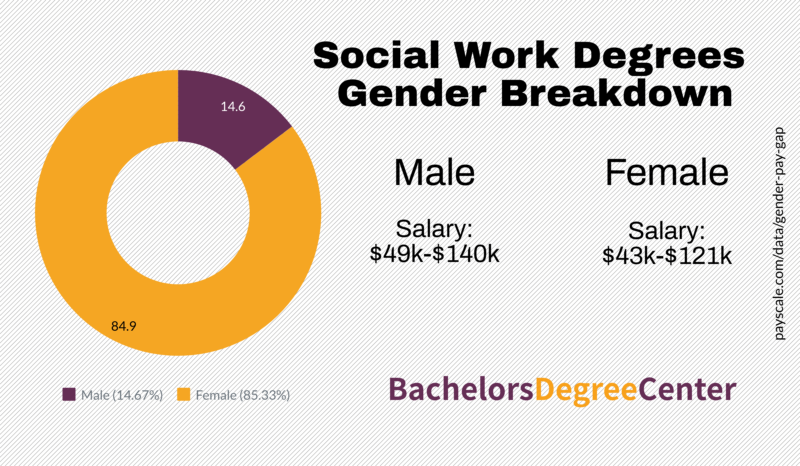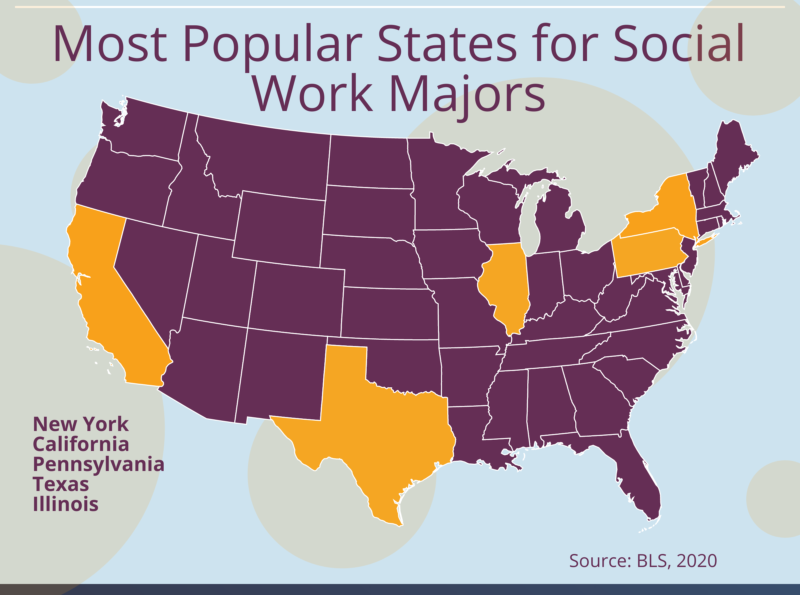When you are looking into career opportunities, you may have questions about the appropriate undergraduate degree to reach your goals. What is a degree in social work? Is social work for me? These questions may help you evaluate when to pursue a degree that allows you to work with others and help them with concerns that may arise.
A degree in social work refers to a bachelor’s degree from an accredited university that focuses on social work as an industry and field of study. When you ask should I become a social worker or should I be a social worker, you must evaluate your goals. At the undergraduate level, a social worker may work in mental health, aging services, or child and family services. In most cases, you would work under a specialist or you work within an organization to provide specific services to your clients.

Social workers help others in a variety of different settings and environments. An undergraduate degree in social work prepares you to work in different fields or industries. The challenge is ensuring that you are prepared for the rigors of your career before move forward with your plans for your education. If you want to work with others and help them succeed, overcome obstacles, or get through a difficult time, then social work may be the right degree to help with your long-term goals.
Accreditation and Education
A critical part of evaluating a college or university for your social work degree is the accreditation of the program. You do not want to attend any college or university that does not have accreditation for social work programs. If the school is not accredited, then it may hinder your career objectives or even result in losing opportunities.
As a general rule, social work accreditation that you want in a college or university is through the Council on Social Work Education, or CSWE. The best online schools for bachelor’s in social work will also have CSWE accreditation for the program, so you want to look into the school’s accreditation and standards.
Social work school accreditation from the Council on Social Work Education ensures that the school meets or exceeds the standards set by the accrediting body. You do not need to worry that you will not find a program that fits your goals. The accrediting body has recognized more than 500 undergraduate programs across the country for their social work programs.
Even if you are looking into the best online school for social work degree programs, you will find that the online programs also meet or exceed the accreditation standards. Before you finalize a school for your education, look for the accreditation and make sure that the school is appropriate for your goals. Avoid any school that does not have accreditation or is unclear about accreditation, since it may impact your options for your career.
Types of Social Work Undergraduate Degrees
The decision to pursue an undergraduate degree in social work inevitably raises concerns about the kinds of social work degree programs that may fit your goals. The different social work fields do not greatly impact your undergraduate degree. As a general rule, the different fields of social work relate directly to careers and work opportunities.
Although the different careers in social work do not always have undergraduate programs that offer specialized education, it is important to recognize the potential for electives or concentrations within a bachelor’s degree program to influence your career opportunities. You should also be aware that an online degree in social work offers similar opportunities to traditional education.
Online degrees in social work may offer specialized concentrations in specific areas of social work. The online degrees for social work may also offer elective courses to gain specialized skills if it does not offer specialized concentrations. You will want to be clear about the area of social work that fits your long-term career goals before you determine that a school or program is appropriate for your needs.
A social working degree online may also require similar internship and mentorship standards as a traditional program. In most cases, degrees in social work online set similar goals for student outcomes, so you should be prepared for the hands-on standards set by the school to help with your career objectives.
If you are concerned that a social work online degree program or a traditional degree program will not allow you to start working, then you can also consider a social work certificate program. Certificate programs in social work differ from social work degrees online and traditional on-campus programs by allowing students to gain specialized skills at a fast pace. Since social work certificate programs are not an undergraduate degree, it may allow students to start working under a social worker while they complete their bachelor’s degree.
Online certificate programs for social work may also offer opportunities to specialize in a specific field of social work. The way online social work certificate programs work is simple: you take some social work courses or specialized courses and complete the program to gain certification. You can either use the certification to start working as you complete an undergraduate program or you can use the certification to enhance your skills when you are ready to evaluate our career options.
Social work certificate programs online offer similar flexibility as the online bachelor’s degree programs. The primary difference is the amount of time required to complete social work online certificate programs. It will usually take less time when compared to a degree.

What are the different fields of social work that may influence your career opportunities? It depends on your goals and interests. Community social workers or social workers in family, child, or school settings are well-known areas of the industry. Many social workers focus on careers that emphasize working with families or communities. You also have opportunities in the criminal justice system or in the medical industry.
Working with lawyers or law enforcement officials may allow social workers to identify high-risk situations or individuals who are not treated with the proper care or given appropriate guidance through the system. If you decide to work in the medical industry, then you may work directly with doctors and nurses to help patients who may need financial assistance or may have a high risk of problems at home.
Social work in mental health industries may fall into a few categories. You may work with individuals who have problems with specific mental health conditions or who are struggling with substance abuse. You may also take a more focused approach and work with military veterans who are struggling to move onto a civilian lifestyle or who may need assistance due to Post Traumatic Stress Disorder. A common area of study for many social workers is in the mental health field or in psychiatry, so students can gain specialized skills in the industry.
For students who want to work in government, online social work degrees and traditional programs may offer opportunities in administration and policy. You may have an opportunity to influence the outcome of new policies to improve social outcomes for communities or demographic groups.
Students may also gain specialized skills in aging care or working with the elderly. Working with the elderly allows students to gain unique perspectives on the healthcare industry, the challenges that may face older individuals, and the changes that arise when aging.
The fields of social work influence your education and your goals. By clarifying the industries and fields that are most appropriate for your plans, you are able to develop the skills that you need to work on your plans. You may need to gain specialized certifications or take a specific concentration in your undergraduate program to gain the relevant skills to work in a specific area of social work.
Certifications/Licenses for Social Work
When it comes to social work certification programs, you want to clarify the options that are best for your goals. A social work certification online may offer specialized training in specific fields of social work that help you with your long-term plans. Alternatively, social work certification programs online may focus on general topics of study.
If you are looking at social work certifications online, then make sure you understand the details of the program. Certification is not a bachelor’s degree. It enhances your degree or allows you to start working under a licensed social worker when you are still working on your bachelor’s degree. You should be aware of the limitations as well as the potential benefits of the certification as it applies to your career before you decide to pursue it.
Although certification is optional for social workers, you should be aware that social work licensure is required for your career in most situations. Licensure for social workers is designed to protect the public by ensuring ethical practices and high standards of conduct. You will need a license to be a social worker in most states and local areas, so you want to clarify the standards for social worker credentials in your locality to ensure that you meet or exceed the standards.
The social worker licensure requirements may vary slightly by state, so make sure you understand the licensing requirements for social workers in your state before you move forward with your plans. While specific standards for the social worker license requirements may vary slightly, most states require you to obtain your bachelor’s degree and then take a licensure exam for social workers.
The social worker licensure exam tests your knowledge from your studies and makes sure that you understand the ethics involved in social work. After you pass the exam and finish your degree, you will be able to meet the social work licensing requirements and you can move forward with your career objectives. At the undergraduate level, licensure does not require students to obtain hands-on training, so students can take the exam after finishing their degrees.
Careers in Social Work
After you have completed your degree and obtained a license, what does a social worker do? What can I do with a degree in social work? It depends on your interests and your goals. When you ask what can I do with a social work degree, you are not only evaluating your options within social work. You also want to consider alternatives that may be available.

What jobs can a social work degree get you? As a rule, an entry-level social worker will start out in a field of social work that interests them. For example, you may work in mental health or psychiatry. Alternatively, you may work directly with children in a school environment or a family environment. Positions in social work vary based on the local area and the need for social workers, so you will want to look into the options before you finalize a career path.
Where does a social worker work? It depends on their field of social work and their career goals. You may work from an office when working in administration positions or working on policy. If you are working in the medical field, then you may work in a hospital or a medical facility. If you are asking where can I work as a social worker, then you should be aware that you have a variety of opportunities and options.
Employment for social workers is not limited to work as a social worker. You may have opportunities in human resources, health education, community outreach, or corporate social responsibility. You can work in the private or the public sector, so you will want to evaluate your goals when looking into job opportunities for social workers.
The list of jobs for social workers is variable. While opportunities are available in social work careers and directly in fields of social work, you may also have opportunities in corporate settings. The role of a social worker in a corporate environment is ensuring that the company meets high ethical standards and complies with certain legal standards. You may also work in government on policy and research.
If you decide to focus on social work careers, then you can find opportunities within the medical industry, veteran services, family services, community services, or mental health services. You can work with all age groups or specialize in a specific age group. Social workers have opportunities in multiple industries because they may be working in a variety of positions. You may work directly with families to address concerns about abuse, neglect, or even just problems associated with poverty. You may also work with medical facilities to identify high-risk individuals or situations where an individual may need assistance working through the system.
Social workers are able to adapt to many fields and industries. Whether you want to work in the legal field, the medical field, or the private sector, you have options that may help with your goals.
Salary for Social Workers
When it comes to a social worker’s salary, you should be aware that the actual income varies based on your job, your responsibilities, and your industry. The salary of a social worker is not the same across all fields and industries. It may be higher when you work in a corporate environment when compared to a government position or a role in a public position.
While the salaries of social workers may differ based on the job, the average salary of a social worker gives you a good idea of your income potential. The average salary for social workers is around $49,000 per year. The salary for a social worker who is starting out in his or her career may be lower than the average. The pay of a social worker may also increase over time as you gain experience and develop your skills.
How much does a social worker make? It depends on salaries for social workers in the local area and the position of the individual. The social work annual salary varies based on position and experience. How much do social workers make when they work in the public sector? The Bureau of Labor Statistics states that social worker starting salaries may be as low as $30,700 per year. When it comes to how much do social workers make a year, it also depends on their position. According to the Bureau of Labor Statistics, or BLS, healthcare social workers may earn as much as $56,000 per year. How much does a social worker make a year when working in child services? According to BLS, the salary is around $46,000 per year.
If you are looking into how much does a social worker get paid when working in hospitals, then you can expect a slightly higher salary of around $60,000 per year. How much money does a social worker make in the private sector? It depends on the corporate environment and the company. The BLS states that the highest-paid social workers make around $81,000 per year. You can expect that the highest-paid human services jobs in the public sector will make less when compared to the private sector.
Salary potential for social workers may vary widely based on the industry, the position, your location, and your work experience. You should expect some variation in the potential as you gain experience and start to build your career. If you decide to pursue a career in the public sector, then you can expect slightly lower salary potential when compared to corporate positions. Working with hospitals and medical facilities may offer a higher income; however, you can find reasonable income in most areas of social work.

Professional Organizations in Social Work
If you are planning to work as a social worker, then you want to evaluate the professional organizations available for your career. Professional organizations offers critical benefits that help you advance in your career and meet new objectives for your future. A common reason to join a professional organization when you complete your degree and obtain your license is the opportunity to network. You are able to meet other social workers and get advice about how to handle your career goals. You may also have opportunities to find out about positions through the organization that are not available on other websites or through other organizations.
Professional organizations in social work also help you keep up with continuing education standards for your license. You will need to keep up with continuing education over time. That means you will need to find ways to take courses on different areas of study or specialized studies within social work. By joining an organization, you may gain access to continuing education materials and courses that help you keep up with changing trends or details within the social work industry.
Another critical aspect of joining a professional organization is the opportunity to learn from more experienced social workers. You interact and network with individuals who have different levels of experience. By asking for advice from others in the organization, you are able to learn new ways to handle challenging situations that may arise in your career.
Professional organizations for social work generally fall into two primary categories: general social work organizations or specialized organizations. The American Clinical Social Work Association or the Clinical Social Work Association are examples of general organizations. Social workers from different backgrounds can join the organizations, network, and make use of the resources available through the organization. The Association of Oncology Social Work, the American Association for Geriatric Psychiatry, or the American Professional Society on the Abuse of Children are specialized organizations that emphasize specific aspects of social work.
You will want to focus on professional organizations in social work that are ideal for your current work and experience. You can also join organizations if you are planning to work in a specific field and want to gain the opportunity to network and find out about available positions in your field. The key is clarifying what organizations are ideal for your career goals and your field of social work to join the right organizations.
Related Rankings:
25 Best Bachelor’s in Social Work
15 Best Online Bachelor’s in Social Work
10 Fastest Online Bachelor’s in Social Work
10 Most Affordable Bachelor’s in Social Work
